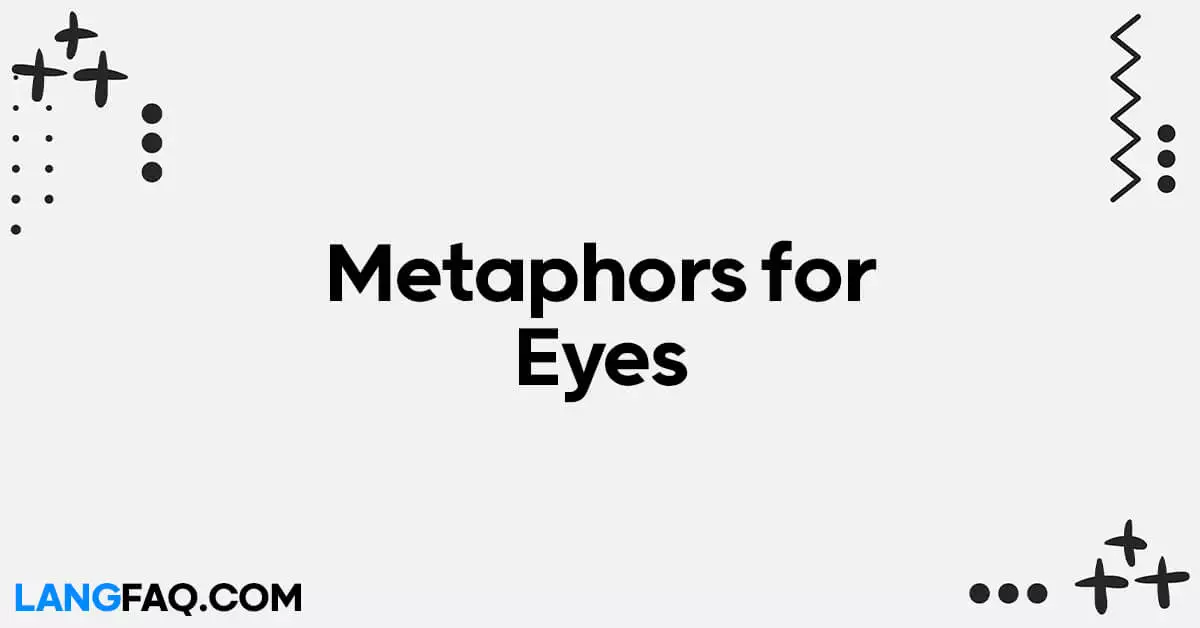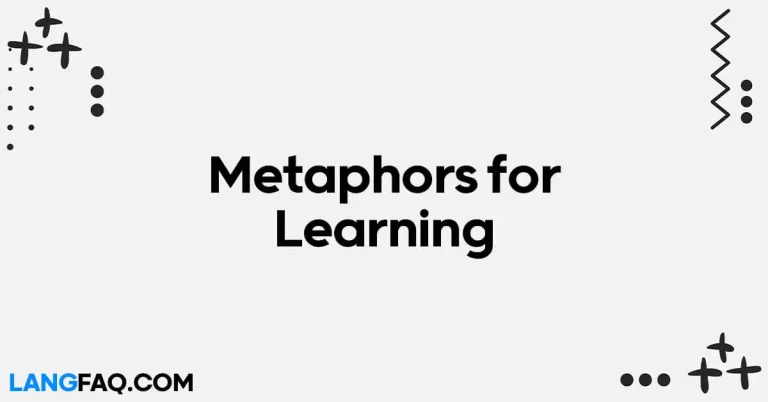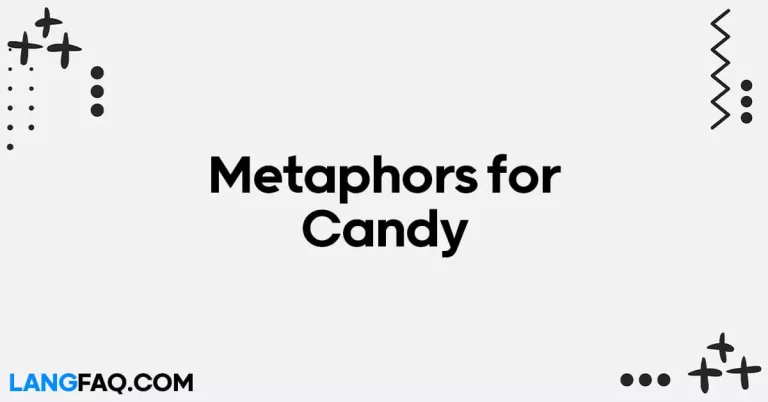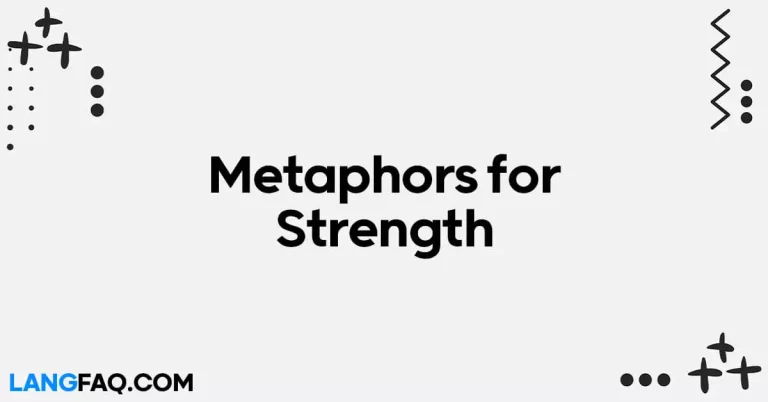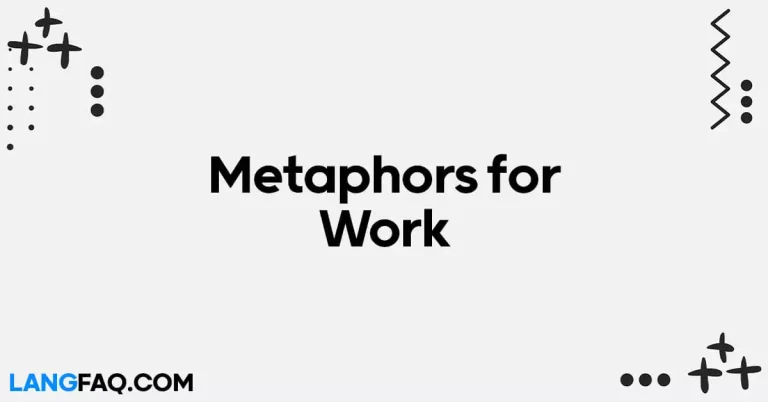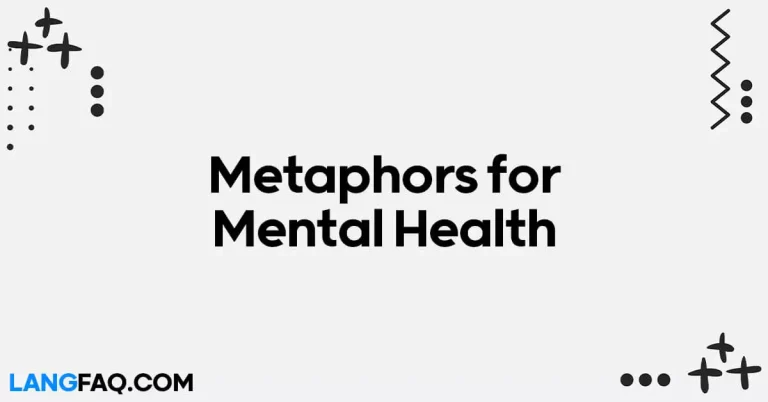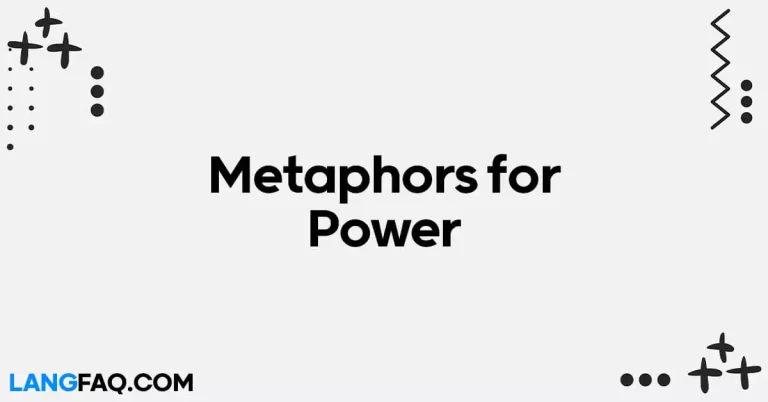Eyes are not merely biological marvels that enable us to perceive the beauty of the world; they are also rich sources of symbolism and metaphor. Throughout history and across cultures, eyes have been used as powerful symbols to convey a wide range of emotions, experiences, and concepts.
In this article, we will embark on a journey through the world of metaphors for eyes, shedding light on their meanings and cultural significance. From “the apple of my eye” to “the windows to the soul,” these metaphors offer a glimpse into the depth of human expression.
26 Metaphors for Eyes
- Windows to the Soul: Eyes are often seen as a reflection of a person’s innermost thoughts and emotions.
- Mirrors of the Heart: Just like mirrors, eyes can reveal our feelings and emotions.
- The Light in Your Eyes: When someone’s eyes light up, it signifies excitement or happiness.
- The Apple of My Eye: This metaphor expresses deep affection and love for someone.
- Eyes Like Diamonds: Describes sparkling and radiant eyes, often used as a compliment.
- Eyes That Speak Volumes: When eyes convey a lot without words.
- The Twinkle in Your Eye: Signifies a mischievous or playful look in someone’s eyes.
- Eyes as Pools of Emotion: Suggests that emotions run deep within a person.
- The Window to the Heart: Like the window to the soul, it emphasizes insight into emotions.
- Eyes that Betray: When true feelings or intentions become evident through one’s gaze.
- The Gateway to Understanding: Implies that looking into someone’s eyes helps us understand them better.
- Eyes Full of Compassion: Expresses empathy and understanding through the gaze.
- Eyes That Sparkle with Joy: Captures genuine happiness and delight in one’s eyes.
- Eyes as Deep as Oceans: Like vast oceans, they contain endless depths of emotions.
- The Language of the Eyes: Suggests that eyes can communicate as effectively as words.
- Eyes as Guiding Stars: Like stars in the night sky, they offer direction and inspiration.
- Eyes as Timekeepers: Highlights the idea that eyes reveal the passage of time and wisdom.
- Eyes that Hold Secrets: Implies that eyes conceal hidden thoughts or desires.
- Eyes as Sentinels: Watchful and observant, always on the lookout.
- Eyes That See Beyond: Suggests the ability to perceive deeper truths and insights.
- Eyes as Stars in the Sky: Emphasizes the luminous quality of a person’s eyes.
- Eyes That Dance with Delight: Expresses sheer joy and excitement.
- Eyes as Silent Witnesses: Implies that eyes bear witness to events without words.
- Eyes as Arrows of Love: Like arrows, they captivate and enchant with their gaze.
- Eyes as Beacons of Hope: Offer optimism and encouragement, like guiding beacons.
- Eyes that Hold the Universe: Suggests that a person’s eyes contain vast knowledge and wisdom.
The Light in Your Eyes: Revealing Emotions
Eyes are often described as “the light in your eyes” when they convey intense emotions such as joy, excitement, or love. This metaphor emphasizes the powerful way in which our eyes can reveal our innermost feelings. It’s a versatile phrase that can be used in both formal and informal contexts to express genuine emotion.
Scenario 1 – Informal: Imagine a close friend sharing exciting news with you. You might say, “I can see the light in your eyes! You must be thrilled about your upcoming trip.”
Scenario 2 – Formal: In a professional setting, you can use this metaphor to acknowledge a colleague’s enthusiasm. For example, “I noticed the light in your eyes during the presentation; it’s clear you’re passionate about this project.”
Variations:
- “The sparkle in your eyes” – Used interchangeably with “the light in your eyes.”
- “Your eyes are beaming” – Indicates happiness or excitement.
Dictionary Insight: According to the Cambridge Dictionary, “the light in someone’s eyes” refers to a person looking happy, excited, or enthusiastic about something.
Pros:
- Expresses genuine enthusiasm or happiness.
- Suitable for various relationships and contexts.
Cons:
- May not be suitable for conveying negative emotions.
Grammar/Usage Rule: This phrase is often used in the present continuous tense, such as “I can see the light in your eyes.”
Exception: While it’s typically used to express positive emotions, it can be used ironically to convey sarcasm or skepticism. For example, “I can see the light in your eyes when you talk about doing the dishes.”
Eyes Like Diamonds: Complimenting Beauty
When someone’s eyes are compared to diamonds, it’s a poetic way of complimenting their beauty and sparkle. This metaphor is often used in more formal contexts to convey admiration and appreciation.
Scenario 1 – Formal: You’re attending a formal event, and you want to compliment someone’s appearance. You might say, “Your eyes are like diamonds tonight, absolutely stunning.”
Variations:
- “Your eyes sparkle like diamonds” – Emphasizes the radiant quality of their eyes.
Dictionary Insight: While not a common phrase in dictionaries, it draws on the idea that diamonds are precious and beautiful, making it a high compliment.
Pros:
- Offers a high level of admiration and praise.
- Appropriate for formal occasions and professional settings.
Cons:
- May be considered overly formal or intense in casual conversations.
Grammar/Usage Rule: This phrase is often used to compare the eyes directly to diamonds, as in “Your eyes are like diamonds.”
Exception: Use this metaphor sparingly to avoid sounding insincere or overly formal in casual conversations.
Eyes That Speak Volumes: Non-Verbal Communication
“Eyes that speak volumes” is a metaphor that highlights the expressive power of our gaze. It suggests that our eyes can convey a wealth of information, emotions, and thoughts without the need for words. This phrase is versatile and can be used in various contexts.
Scenario 1 – Informal: Imagine a friend confiding in you about their feelings. You might say, “Your eyes speak volumes; I can tell you’re going through a tough time.”
Scenario 2 – Professional: During a business meeting, you notice a colleague’s apprehension. You can use the metaphor to acknowledge this non-verbal communication: “Your eyes speak volumes, and I can sense your concerns about the project.”
Variations:
- “Eyes that tell a story” – Similar to “eyes that speak volumes,” emphasizing the narrative aspect.
Dictionary Insight: The phrase “speak volumes” is commonly used to indicate that something conveys a lot of information or meaning.
Pros:
- Highlights the power of non-verbal communication.
- Applicable in both personal and professional contexts.
Cons:
- Can be overly intense if used casually.
Grammar/Usage Rule: This phrase is typically used in the present tense, such as “Your eyes speak volumes.”
Exception: While it’s generally used to convey depth of emotion, it can also be employed ironically in a lighthearted context. For example, “Your eyes speak volumes when you see a plate of your favorite dessert.”
Eyes as Pools of Emotion: Deep and Profound
Describing someone’s eyes as “pools of emotion” suggests that their emotions are deep and profound, much like the depths of a pool. This metaphor is often used in more poetic or literary contexts to convey the intensity of one’s feelings.
Scenario 1 – Literary: If you’re writing a poem or a piece of literature, you might use this metaphor to evoke strong emotions in your readers. For example, “Her eyes were like pools of emotion, reflecting the tumultuous sea of her heart.”
Variations:
- “Eyes as deep as oceans” – Similar to “pools of emotion,” emphasizing the vastness of emotions.
Dictionary Insight: This metaphor draws on the idea of depth associated with pools and emotions. While not a common phrase in dictionaries, it’s a vivid and evocative description.
Pros:
- Evokes a sense of depth and intensity in emotions.
- Ideal for creative writing and literary contexts.
Cons:
- May sound overly poetic or dramatic in everyday conversations.
Grammar/Usage Rule: This metaphor is often used to compare the eyes directly to pools, as in “Her eyes were like pools of emotion.”
Exception: Use this metaphor sparingly in casual conversations to avoid appearing overly dramatic.
The Gateway to Understanding: Insightful Gaze
Comparing someone’s eyes to a “gateway to understanding” implies that looking into their eyes provides valuable insights into their thoughts, feelings, and experiences. This metaphor is suitable for both formal and informal contexts.
Scenario 1 – Personal: During a heart-to-heart conversation with a friend, you might say, “Your eyes are like a gateway to understanding; I can truly connect with you when I look into them.”
Scenario 2 – Professional: In a workplace setting, you can use this metaphor to acknowledge a colleague’s ability to convey information effectively. For instance, “Your presentation was excellent; your eyes were a gateway to understanding the complex topic.”
Variations:
- “Eyes that offer insight” – Emphasizes the idea of gaining valuable information through someone’s gaze.
Dictionary Insight: The word “gateway” is often used metaphorically to signify access or entry to something.
Pros:
- Conveys the idea of gaining insights through eye contact.
- Appropriate for various relationships and contexts.
Cons:
- May not be suitable for casual or lighthearted conversations.
Grammar/Usage Rule: This metaphor is often used in the present tense, such as “Your eyes are a gateway to understanding.”
Exception: Use it thoughtfully to avoid appearing overly formal in casual conversations.
Eyes Full of Compassion: Expressing Empathy
Describing someone’s eyes as “full of compassion” indicates that their gaze conveys deep empathy and understanding. This metaphor is particularly useful when acknowledging someone’s kindness and empathy.
Scenario 1 – Gratitude: If a friend has supported you during a difficult time, you might express your gratitude by saying, “Your eyes are always full of compassion, and I appreciate your support.”
Variations:
- “Eyes filled with empathy” – Emphasizes the ability to understand and share the feelings of others.
Dictionary Insight: “Compassion” is defined as a feeling of deep sympathy and sorrow for another who is stricken by misfortune, accompanied by a strong desire to alleviate the suffering.
Pros:
- Conveys a high level of empathy and kindness.
- Appropriate for expressing gratitude and acknowledging support.
Cons:
- May be considered overly formal in casual conversations.
Grammar/Usage Rule: This metaphor is often used in the present tense, such as “Your eyes are full of compassion.”
Exception: Use it in situations that warrant a more formal or appreciative tone.
Eyes That Sparkle with Joy: Genuine Delight
When someone’s eyes “sparkle with joy,” it signifies their genuine happiness and delight. This metaphor is commonly used in casual and friendly contexts to express shared moments of happiness.
Scenario 1 – Celebratory Occasion: During a birthday celebration, you might say to the guest of honor, “Your eyes are sparkling with joy! It’s evident that you’re having a fantastic time.”
Variations:
- “Eyes filled with delight” – Conveys a similar sense of happiness and pleasure.
Dictionary Insight: “Sparkle” is defined as to shine brightly with flashes of light, often associated with joy or excitement.
Pros:
- Expresses happiness and delight in a friendly manner.
- Suitable for casual and celebratory conversations.
Cons:
- May not be appropriate for more serious or formal discussions.
Grammar/Usage Rule: This metaphor is often used in the present tense, such as “Your eyes sparkle with joy.”
Exception: Use it in informal and lighthearted conversations to capture moments of shared happiness.
Eyes as Deep as Oceans: Profound Emotions
Describing someone’s eyes as “deep as oceans” suggests that their emotions are vast and profound, much like the depths of the ocean. This metaphor is often used in poetic or reflective contexts.
Scenario 1 – Poetic Expression: If you’re writing a heartfelt letter to a loved one, you might use this metaphor to convey the depth of your emotions. For example, “Your eyes, deep as oceans, hold the mysteries of your soul.”
Variations:
- “Eyes as vast as the sea” – Emphasizes the vastness and mystery associated with the ocean.
Dictionary Insight: This metaphor draws on the idea of depth and vastness associated with oceans, making it a vivid description.
Pros:
- Evokes a sense of profound emotions and mystery.
- Ideal for poetic or reflective writing.
Cons:
- May sound overly dramatic in everyday conversations.
Grammar/Usage Rule: This metaphor is often used to compare the eyes directly to oceans, as in “Her eyes were as deep as oceans.”
Exception: Use this metaphor sparingly in casual conversations to avoid appearing overly poetic.
The Language of the Eyes: Silent Communication
When we refer to “the language of the eyes,” we emphasize the idea that eyes can communicate feelings and emotions as effectively as words. This metaphor can be used in various contexts to acknowledge the power of non-verbal communication.
Scenario 1 – Personal Connection: During a heartfelt conversation with a friend, you might say, “We don’t always need words to understand each other; we speak the language of the eyes.”
Scenario 2 – Professional Acknowledgment: In a workplace setting, you can use this metaphor to appreciate a colleague’s ability to convey ideas non-verbally. For instance, “Your eye contact during the presentation spoke the language of confidence and expertise.”
Variations:
- “Eyes that convey messages” – Emphasizes the idea of eyes as messengers of emotions.
Dictionary Insight: The phrase “language of” is often used to signify a means of communication or expression.
Pros:
- Highlights the effectiveness of non-verbal communication.
- Appropriate for various relationships and contexts.
Cons:
- May not be suitable for very formal or official conversations.
Grammar/Usage Rule: This metaphor is often used in the present tense, such as “We speak the language of the eyes.”
Exception: Use it thoughtfully to convey the idea of non-verbal communication in appropriate situations.
Eyes as Guiding Stars: Providing Direction
Comparing someone’s eyes to “guiding stars” suggests that they offer direction, inspiration, and a sense of purpose. This metaphor is versatile and can be used in both personal and professional contexts to acknowledge someone’s guidance.
Scenario 1 – Personal Appreciation: If a mentor has provided valuable guidance in your life, you might express your gratitude by saying, “Your eyes have always been my guiding stars, leading me on the right path.”
Scenario 2 – Professional Acknowledgment: In a work-related setting, you can use this metaphor to acknowledge a supervisor’s ability to provide direction and inspiration. For example, “Your leadership has made your eyes the guiding stars for our team’s success.”
Variations:
- “Eyes that inspire” – Emphasizes the motivational aspect of someone’s gaze.
Dictionary Insight: “Guiding star” is a metaphorical phrase often used to represent something that provides guidance or inspiration.
Pros:
- Conveys appreciation and inspiration.
- Suitable for various relationships and contexts.
Cons:
- May not be appropriate for casual or lighthearted conversations.
Grammar/Usage Rule: This metaphor is often used in the present tense, such as “Your eyes are my guiding stars.”
Exception: Use it thoughtfully to convey a sense of guidance and inspiration in appropriate situations.
Eyes as Timekeepers: Reflecting Wisdom
Describing someone’s eyes as “timekeepers” suggests that they reflect the passage of time and the wisdom that comes with age and experience. This metaphor is often used in more reflective or philosophical contexts.
Scenario 1 – Reflective Thought: If you’re writing a reflective essay about the passage of time, you might use this metaphor to convey the idea. For example, “His eyes, like timekeepers, held the wisdom of decades.”
Variations:
- “Eyes that hold the wisdom of years” – Emphasizes the idea of accumulated wisdom.
Dictionary Insight: “Timekeeper” refers to a person or thing that records or measures time.
Pros:
- Evokes a sense of wisdom and experience.
- Ideal for reflective or philosophical writing.
Cons:
- May sound overly dramatic in everyday conversations.
Grammar/Usage Rule: This metaphor is often used to compare the eyes directly to timekeepers, as in “His eyes were like timekeepers.”
Exception: Use this metaphor sparingly in casual conversations to avoid appearing overly philosophical.
Eyes that Hold Secrets: Concealing Knowledge
“Eyes that hold secrets” imply that someone’s gaze conceals hidden thoughts, desires, or knowledge. This metaphor can be used in various contexts, from mysterious storytelling to acknowledging someone’s ability to keep confidences.
Scenario 1 – Mystery Writing: If you’re writing a mystery novel, you might use this metaphor to describe a character’s enigmatic eyes. For example, “Her eyes held secrets that could unravel the entire mystery.”
Scenario 2 – Trust and Discretion: In a personal conversation with a friend, you might appreciate their ability to keep your secrets by saying, “Your eyes are like a vault; they hold my deepest secrets.”
Variations:
- “Eyes that conceal mysteries” – Emphasizes the mysterious aspect of someone’s gaze.
Dictionary Insight: “Hold secrets” means to keep information hidden or undisclosed.
Pros:
- Adds an element of mystery or intrigue.
- Appropriate for both creative and personal contexts.
Cons:
- May not be suitable for very formal or official conversations.
Grammar/Usage Rule: This metaphor is often used in the present tense, such as “Her eyes hold secrets.”
Exception: Use it thoughtfully to convey a sense of mystery or trust in appropriate situations.
Eyes as Sentinels: Watchful and Observant
When someone’s eyes are described as “sentinels,” it means they are watchful, vigilant, and observant, always on the lookout. This metaphor is versatile and can be used in both personal and professional contexts to acknowledge someone’s attentiveness.
Scenario 1 – Personal Acknowledgment: If you have a friend who is exceptionally attentive to your needs, you might say, “Your eyes are like sentinels, always looking out for me.”
Scenario 2 – Professional Setting: In a workplace scenario, you can use this metaphor to appreciate a colleague’s keen observation skills. For instance, “Your attention to detail and watchful eyes have been instrumental in our project’s success.”
Variations:
- “Eyes that remain vigilant” – Emphasizes the idea of constant alertness.
Dictionary Insight: “Sentinel” refers to a guard or watchman who keeps watch and protects.
Pros:
- Conveys attentiveness and vigilance.
- Suitable for various relationships and contexts.
Cons:
- May not be appropriate for casual or lighthearted conversations.
Grammar/Usage Rule: This metaphor is often used in the present tense, such as “Your eyes are sentinels.”
Exception: Use it thoughtfully to convey a sense of vigilance and attentiveness in appropriate situations.
Eyes That See Beyond: Perceiving Deeper Truths
Comparing someone’s eyes to those that “see beyond” suggests that they possess the ability to perceive deeper truths and insights that may elude others. This metaphor is often used in more philosophical or contemplative contexts.
Scenario 1 – Philosophical Discussion: If you’re engaged in a deep conversation about spirituality or enlightenment, you might use this metaphor to describe a wise person’s gaze. For example, “His eyes see beyond the surface; they perceive the interconnectedness of all things.”
Variations:
- “Eyes that glimpse the hidden” – Emphasizes the idea of uncovering hidden truths.
Dictionary Insight: “See beyond” implies the ability to look deeper or perceive underlying truths.
Pros:
- Evokes a sense of depth and insight.
- Ideal for philosophical or contemplative discussions.
Cons:
- May sound overly dramatic in everyday conversations.
Grammar/Usage Rule: This metaphor is often used to compare the eyes directly to those that “see beyond,” as in “Her eyes are those that see beyond.”
Exception: Use this metaphor sparingly in casual conversations to avoid appearing overly philosophical.
Eyes as Stars in the Sky: Luminous Quality
Describing someone’s eyes as “stars in the sky” emphasizes their luminous and captivating quality. This metaphor is often used in romantic or poetic contexts to convey admiration and attraction.
Scenario 1 – Romantic Expression: If you’re writing a love letter to express your feelings for someone, you might use this metaphor to compliment their eyes. For example, “Your eyes are like stars in the night sky, guiding me with their radiant glow.”
Variations:
- “Eyes that light up the darkness” – Emphasizes the idea of illumination and guidance.
Dictionary Insight: “Stars in the sky” signifies brightness and radiance, often associated with beauty and wonder.
Pros:
- Conveys admiration and romantic feelings.
- Suitable for romantic and poetic expressions.
Cons:
- May not be suitable for very casual or non-romantic conversations.
Grammar/Usage Rule: This metaphor is often used to compare the eyes directly to stars, as in “Her eyes are like stars in the sky.”
Exception: Use it thoughtfully in appropriate situations to convey admiration or romantic feelings.
Eyes That Dance with Delight: Expressing Joy
When someone’s eyes “dance with delight,” it signifies their pure and uncontainable joy and excitement. This metaphor is commonly used in informal, friendly, and celebratory contexts to express shared moments of happiness.
Scenario 1 – Celebration: During a festive gathering with friends, you might say to the host, “Your eyes are dancing with delight! This party is a huge success.”
Variations:
- “Eyes that twinkle with happiness” – Emphasizes the playful and joyful aspect of the gaze.
Dictionary Insight: “Dance with delight” signifies a lively and joyful expression, often associated with celebration.
Pros:
- Expresses happiness and excitement in a friendly manner.
- Suitable for informal and celebratory conversations.
Cons:
- May not be suitable for very serious or formal discussions.
Grammar/Usage Rule: This metaphor is often used in the present tense, such as “Your eyes dance with delight.”
Exception: Use it in informal and lighthearted conversations to capture moments of shared happiness.
Eyes as Silent Witnesses: Observers of Events
When we refer to “eyes as silent witnesses,” we imply that they observe and bear witness to events and experiences without the need for words. This metaphor can be used in various contexts to acknowledge the power of observation.
Scenario 1 – Reflective Thought: If you’re writing a reflective piece about the passage of time, you might use this metaphor to convey the idea. For example, “Through the years, our eyes have been silent witnesses to countless moments.”
Scenario 2 – Personal Connection: During a heartfelt conversation with a close friend, you might say, “Our eyes have been silent witnesses to each other’s joys and sorrows.”
Variations:
- “Eyes that observe without judgment” – Emphasizes the non-judgmental aspect of observation.
Dictionary Insight: “Silent witness” refers to someone or something that observes events or experiences without actively participating.
Pros:
- Highlights the power of observation and shared experiences.
- Appropriate for both personal and reflective contexts.
Cons:
- May not be suitable for very formal or official conversations.
Grammar/Usage Rule: This metaphor is often used in the present tense, such as “Our eyes are silent witnesses.”
Exception: Use it thoughtfully to convey the idea of observation and shared experiences in appropriate situations.
Eyes as Arrows of Love: Enchanting Gaze
When someone’s eyes are described as “arrows of love,” it implies that their gaze is captivating, enchanting, and has the power to arouse romantic feelings. This metaphor is often used in romantic or poetic contexts.
Scenario 1 – Romantic Expression: If you’re writing a love letter to express your feelings for someone, you might use this metaphor to compliment their eyes. For example, “Your eyes are like arrows of love, piercing my heart with their enchanting gaze.”
Variations:
- “Eyes that stir the heart” – Emphasizes the idea of stirring romantic feelings.
Dictionary Insight: “Arrows of love” signifies the power of attraction and romantic allure often associated with passionate love.
Pros:
- Conveys romantic admiration and attraction.
- Suitable for romantic and poetic expressions.
Cons:
- May not be suitable for very casual or non-romantic conversations.
Grammar/Usage Rule: This metaphor is often used to compare the eyes directly to arrows of love, as in “Her eyes are arrows of love.”
Exception: Use it thoughtfully in appropriate situations to convey romantic feelings and admiration.
Eyes as Beacons of Hope: Inspiring Optimism
When someone’s eyes are described as “beacons of hope,” it suggests that their gaze inspires optimism, positivity, and a sense of guidance. This metaphor is versatile and can be used in both personal and professional contexts to acknowledge someone’s ability to uplift others.
Scenario 1 – Personal Expression: If a friend has been a source of encouragement during challenging times, you might say, “Your eyes are like beacons of hope, guiding me through the toughest moments.”
Scenario 2 – Professional Acknowledgment: In a workplace setting, you can use this metaphor to appreciate a colleague’s ability to inspire positivity. For example, “Your leadership has made your eyes the beacons of hope for our team’s morale.”
Variations:
- “Eyes that radiate positivity” – Emphasizes the idea of spreading optimism.
Dictionary Insight: “Beacon of hope” signifies a source of inspiration and encouragement, often associated with optimism.
Pros:
- Conveys optimism and positivity.
- Suitable for various relationships and contexts.
Cons:
- May not be appropriate for very formal or official conversations.
Grammar/Usage Rule: This metaphor is often used in the present tense, such as “Your eyes are beacons of hope.”
Exception: Use it thoughtfully to convey a sense of optimism and inspiration in appropriate situations.
Eyes that Hold the Universe: Vast Knowledge
Describing someone’s eyes as those that “hold the universe” suggests that they contain vast knowledge, wisdom, and insights about the world. This metaphor is often used in more philosophical or contemplative contexts.
Scenario 1 – Philosophical Discussion: If you’re engaged in a deep conversation about the nature of knowledge and wisdom, you might use this metaphor to describe a learned individual’s gaze. For example, “His eyes, those that hold the universe, contain the wisdom of generations.”
Variations:
- “Eyes that encompass the cosmos” – Emphasizes the idea of vast knowledge.
Dictionary Insight: “Hold the universe” signifies the idea of containing immense knowledge and insights about the world.
Pros:
- Evokes a sense of profound wisdom and knowledge.
- Ideal for philosophical or contemplative discussions.
Cons:
- May sound overly dramatic in everyday conversations.
Grammar/Usage Rule: This metaphor is often used to compare the eyes directly to those that “hold the universe,” as in “Her eyes are those that hold the universe.”
Exception: Use this metaphor sparingly in casual conversations to avoid appearing overly philosophical.
Incorporating these metaphors into your communication can add depth and creativity to your language. Whether you’re expressing admiration, acknowledging someone’s qualities, or simply indulging in poetic expression, these metaphors for eyes provide a rich tapestry of words to draw upon. Remember to use them thoughtfully and consider the context to ensure your message is effectively conveyed.
FAQs
Q: Are these metaphors for eyes universal? A: While some metaphors, like “the windows to the soul,” are widely recognized, others may be more culturally specific. The interpretation of these metaphors can vary.
Q: Can I create my own metaphors for eyes? A: Absolutely! Metaphors are a creative way to express emotions and ideas. Feel free to craft your own metaphors based on personal experiences.
Q: Why are eyes so often used in metaphors? A: Eyes are not only essential for vision but also highly expressive. They can convey a wide range of emotions and thoughts, making them rich metaphors.
Q: Do metaphors for eyes have historical significance? A: Yes, many of these metaphors have been used for centuries in literature, art, and cultural traditions, reflecting their enduring significance.
Q: Are there negative metaphors for eyes? A: Yes, some metaphors can carry negative connotations, such as “eyes that betray.” These suggest a lack of sincerity or hidden motives.
Q: Can metaphors for eyes change over time? A: Indeed, language and culture evolve, and so do metaphors. New metaphors may emerge, while old ones can fade into obscurity.
Conclusion
Eyes have captivated human imagination for centuries, inspiring poets, writers, and artists to craft metaphors that convey the depth of human emotion and experience. From being “windows to the soul” to “beacons of hope,” these metaphors continue to illuminate our understanding of the world.
As you gaze into the eyes of others, remember that they hold not only the beauty of the world but also the richness of human expression and symbolism.

